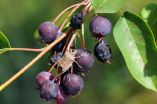After Ebola, understanding health care needs among rural Liberians
2015-06-29
(Press-News.org) WASHINGTON (June 29, 2015) -- As Liberia rebuilds a health care system decimated by the 2014 Ebola outbreak, understanding precisely how far citizens live from health facilities and its impact on seeking care can help shape new strategies to improve health care delivery and reduce geographic disparities.
A new examination of remoteness as a barrier to health care, published online today in the Journal of Global Health, notes that most surveys and policy documents categorize families as living either in an urban or rural setting, and this dichotomy can mask disparities of the most remote families.
"It's no surprise that those who live in rural areas are less likely to seek essential care from a health care facility, but for those at the farthest distances the disparity in maternal and child services is staggering," says John Kraemer, JD, MPH, assistant professor in the health systems administration department at Georgetown University School of Nursing & Health Studies. "Our study illuminates new opportunities for the health system to close this gap."
Kraemer and his colleagues, including members of Last Mile Health, an organization focused on health in rural Liberia, suggest a number of strategies to better serve those in the most rural settings. These include shifting care to the lowest level provider possible; community health worker-based service delivery; training, formalization, or partnership with traditional or informal providers; mobile clinics and clinical outreach; or reimbursing families for health care seeking and/or transportation costs.
"It is critical that international partners continue supporting Liberia's government after headlines about Ebola fade, and that rural health systems be rebuilt," says Kraemer, also a Scholar with the O'Neill Institute for National and Global Health Law at Georgetown Law. "International human rights law and ethical norms oblige health ministries and their development partners to promote equal access to essential health services."
INFORMATION:
In addition to Kraemer, study authors include Avi Kenny, Gaurab Basu, Madeleine Ballard, Thomas Griffiths, Katherine Kentoffio, Jean Bosco Niyonzima, G. Andrew Sechler, Stephen Selinsky, Rajesh R. Panjabi and Mark J. Siedner.
The authors report having no personal financial interests related to the study.
About Georgetown University Medical Center
Georgetown University Medical Center (GUMC) is an internationally recognized academic medical center with a three-part mission of research, teaching and patient care (through MedStar Health). GUMC's mission is carried out with a strong emphasis on public service and a dedication to the Catholic, Jesuit principle of cura personalis -- or "care of the whole person." The Medical Center includes the School of Medicine and the School of Nursing & Health Studies, both nationally ranked; Georgetown Lombardi Comprehensive Cancer Center, designated as a comprehensive cancer center by the National Cancer Institute; and the Biomedical Graduate Research Organization, which accounts for the majority of externally funded research at GUMC including a Clinical and Translational Science Award from the National Institutes of Health.
ELSE PRESS RELEASES FROM THIS DATE:
2015-06-29
When it comes to the art of persuasion, you can attract more followers if you turn conventional wisdom on its head and stress what you like, not what you do.
A new study, to be published in an upcoming issue of the Journal of Personality and Social Psychology, finds that people are more likely to conform to others' preferences than conform to others' actions. In other words, people want to like what others like, but they want to have or do what others don't have or don't do.
In the study, "Words Speak Louder: Conforming to Preferences More Than Actions," by University ...
2015-06-29
DURHAM, N.C. - Researchers at Duke University School of Medicine and Brigham and Women's Hospital, Harvard Medical School have identified a mechanism that explains why some mutations can be disease-causing in one genome but benign in another.
In a study appearing June 29, 2015, in the journal Nature, the researchers compared thousands of human disease-causing mutations with the analogous sequences of some 100 animal species. They discovered non-human genomes carrying mutations that cause severe disease in humans, yet were benign in the animals.
Although generally in ...
2015-06-29
The brown marmorated stink bug has a bad reputation. And for good reason: every summer, this pest attacks crops and invades homes, causing both sizable economic losses and a messy, smelly nuisance--especially in the eastern United States. A new study by entomologists at the University of Maryland shows that these pests, known simply as stink bugs, have a strong preference for ripe fruit. Moreover, stink bugs track their favorite fruits throughout the growing season in an effort to maximize their access to food.
The study, published online June 25, 2015 in the Journal ...
2015-06-29
PHILADELPHIA -- Since their discovery in the 1950s, transfer RNAs (tRNAs) have been best known for their role in helping the cell make proteins from messenger RNA templates. However, recent studies have led to a previously-unsuspected concept that tRNAs are not always the end product; namely, they further serve as a source of small RNAs. Now researchers have discovered a new species of tRNA-derived small RNAs that are produced only in hormonally-driven breast and prostate cancers, and which contribute to cell proliferation. The results will be published online the week ...
2015-06-29
The warm temperature on a summer's day is often a time for relaxing, but researchers from the University of Leicester have suggested that a 'thermosensory' gene could be responsible for changes in behaviour in different climates.
The researchers from the University of Leicester's Department of Genetics have explored how the biological clock can be affected by the environment by examining the fruitfly Drosophila melanogaster, which shows 24 hour biological cycles and is used as a model organism for studies into human rhythms.
Like many humans, the fly has a 'siesta' ...
2015-06-29
It's been difficult to explain patterns of toxic mercury in some parts of the world, such as why there's so much of the toxin deposited into ecosystems from the air in the southeastern United States, even upwind of usual sources.
A new analysis led by researchers at the University of Colorado Boulder shows that one key to understanding mercury's strange behavior may be the unexpected reactivity of naturally occurring halogen compounds from the ocean.
"Atmospheric chemistry involving bromine and iodine is turning out to be much more vigorous than we expected," said ...
2015-06-29
A University of Oklahoma professor studying malaria mosquito interaction has discovered a new mosquito protein for the development of a new vaccine that is expected to stop the spread of the disease in areas where it is considered endemic. Malaria is transmitted by mosquitoes, and it infects millions of people in Africa, Asia and South America every year, causing a global health crisis. In addition to the local populations, U.S. military personnel stationed in these areas and travelers to these malaria-prone areas are at risk of becoming infected.
Jun Li, assistant ...
2015-06-29
UC Santa Barbara geologist Jim Boles has found evidence of helium leakage from the Earth's mantle along a 30-mile stretch of the Newport-Inglewood Fault Zone in the Los Angeles Basin. Using samples of casing gas from two dozen oil wells ranging from LA's Westside to Newport Beach in Orange County, Boles discovered that more than one-third of the sites -- some of the deepest ones -- show evidence of high levels of helium-3 (3He).
Considered primordial, 3He is a vestige of the Big Bang. Its only terrestrial source is the mantle. Leakage of 3He suggests that the Newport-Inglewood ...
2015-06-29
WASHINGTON (June 29, 2015) -The American College of Cardiology, Heart Rhythm Society and Society for Cardiovascular Angiography and Interventions today released a new overview on the implantation of left atrial appendage occlusion devices.
The implantation of left atrial appendage occlusion devices may lower the risk of stroke in patients with atrial fibrillation. As new devices are developed, it is anticipated that the use of left atrial appendage occlusion technologies in clinical practice will expand. The authors of the paper urge that the new technology should be ...
2015-06-29
Stringing together meaningless sounds to create meaningful signals was previously thought to be the preserve of humans alone, but a new study, publishing June 29th in the Open Access journal PLOS Biology, has revealed that babbler birds are also able to communicate in this way.
Researchers at the Universities of Exeter and Zurich discovered that the chestnut-crowned babbler - a highly social bird found in the Australian Outback - has the ability to convey new meaning by rearranging the meaningless sounds in its calls. This babbler bird communication is reminiscent of ...
LAST 30 PRESS RELEASES:
[Press-News.org] After Ebola, understanding health care needs among rural Liberians


